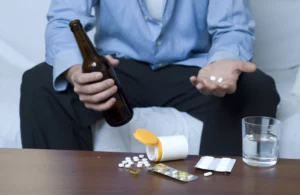Poly substance use disorder is a complex and often misunderstood diagnosis in addiction treatment. In a world where there is no shortage of drugs and substances, many individuals find themselves trapped in a cycle of using multiple substances simultaneously or sequentially, leading to a debilitating condition known as poly substance use disorder. The first step to overcoming the battle that comes with poly substance use disorder is identifying it, educating yourself about it, and learning ways to overcome it.
What is Poly Substance Use Disorder?
Poly substance use disorder is characterized by the persistent and harmful use of multiple substances. These substances can include alcohol, illicit drugs, prescription medications, or a combination thereof. Unlike single-substance addiction, where an individual is primarily dependent on one specific substance, poly substance use disorder involves a pattern of using various substances in tandem or sequentially.
The Causes and Risk Factors of Poly Substance Use Disorder
The development of poly substance use disorder can be attributed to a combination of genetic, environmental, and psychological factors. Some common causes and risk factors include:
- Genetics: Genetic predisposition can play a role in an individual’s vulnerability to substance abuse. People with a family history of addiction may be at a higher risk of developing poly substance use disorder.
- Trauma and Stress: Experiencing trauma, stress, or adverse life events can drive individuals to seek solace in substances as a coping mechanism. The use of multiple substances may intensify as individuals attempt to self-medicate their emotional pain.
- Peer Pressure and Social Environment: Social influences and peer pressure can greatly impact an individual’s substance use habits. Being in an environment where substance abuse is prevalent can increase the likelihood of engaging in polydrug use.
- Mental Health Disorders: Co-occurring mental health disorders, such as depression, anxiety, or bipolar disorder, often coexist with poly substance use disorder. People may use substances to alleviate symptoms, leading to a cycle of dependence.

Signs and Symptoms of Poly Substance Use Disorder
Recognizing poly substance use disorder can be challenging because of the combination of substances and the symptoms involved. The type of substances used, the tolerance to those substances, and co-occurring mental health disorders can make it difficult for diagnosis, requiring a closer look at personal habits and how stress is managed.
Some common signs and symptoms include:
- Frequent Substance Use: Individuals with poly substance use disorder often use multiple substances on a regular basis. They may switch between different drugs or combine them for enhanced effects.
- Tolerance and Withdrawal: Developing a tolerance to one or more substances can lead to increased consumption, making it difficult to achieve the desired effects. Withdrawal symptoms may manifest when the person attempts to reduce or stop using the substances.
- Neglecting Responsibilities: As addiction takes hold, individuals may neglect their personal, professional, and social responsibilities. Work, school, and relationships may suffer as a result.
- Health Issues: Chronic substance abuse can result in a range of physical and mental health problems, including liver damage, respiratory issues, mood disorders, and cognitive impairments.
- Risky Behavior: Poly substance use often leads to risky behaviors such as driving under the influence, engaging in unprotected sex, and involvement in criminal activities.
The signs and symptoms of poly substance use disorder will vary based on the substances being taken and the length of time they have been taken. New combinations may have different effects on the body, which can make it hard to identify if there is a problem. A medical diagnosis should be made by a licensed professional before beginning any type of treatment for this disorder to ensure the best outcome.
Consequences of Poly Substance Use Disorder
Poly substance use disorder can carry a multitude of negative consequences, affecting the individual and their loved ones. Understanding that there are consequences to using multiple substances can help someone decide to take the first step toward leading a sober life.
Some of the consequences of poly substance use disorder include:
- Health Problems: Prolonged use of multiple substances can lead to serious health complications, including organ damage, infectious diseases (such as HIV/AIDS and hepatitis), and an increased risk of overdose.
- Legal Issues: Engaging in illegal activities to support one’s addiction, such as drug trafficking or theft, can result in legal troubles and incarceration.
- Financial Strain: The cost of acquiring multiple substances can be financially crippling. Individuals with poly substance use disorder often struggle to maintain stable employment or financial stability.
- Strained Relationships: Addiction can strain relationships with family and friends due to erratic behavior, deception, and neglect. Trust often deteriorates over time.
- Mental Health Challenges: Co-occurring mental health disorders can worsen, leading to severe anxiety, depression, and suicidal ideation.
Long-term use of substances can have a damaging impact, including irreversible health problems. The sooner someone is diagnosed with poly substance use disorder, the sooner they can begin the road to recovery.

Treatment Options
There is no one-size-fits-all solution for treating poly substance use disorder. Treating the disorder and moving forward requires a comprehensive and individualized approach. Some effective treatment strategies may include:
- Detoxification – The first step is often detoxification, where individuals are safely monitored and supported as they withdraw from substances. Medications may be used to manage withdrawal symptoms.
- Inpatient Rehabilitation – Inpatient rehab programs offer a structured and supportive environment for individuals to address their addiction. Therapy, counseling, and group support are integral components of these programs.
- Outpatient Programs – Outpatient treatment provides flexibility for individuals who cannot commit to full-time residential care. It involves regular therapy sessions and support groups.
- At-Home Detox – Concierge services like MD Home Detox make it possible to detox from substances in the comfort of your own home. They provide guidance and medically trained staff who can assist in the detox process safely and effectively.
- Medication-Assisted Treatment (MAT) – MAT can be particularly effective for certain substance dependencies, such as opioid or alcohol use disorders. Medications like methadone or buprenorphine can help manage cravings and withdrawal symptoms.
- Behavioral Therapy – Cognitive-behavioral therapy (CBT) and motivational enhancement therapy (MET) are often employed to help individuals change their thought patterns and behaviors related to substance use.
- Support Groups – Peer support groups like Narcotics Anonymous (NA) and Alcoholics Anonymous (AA) provide ongoing encouragement and a sense of community for individuals in recovery.
MD Home Detox Can Help with Poly Substance Use Disorder
Poly substance use disorder is a complex and challenging condition that requires the assistance of a trained professional who understands the symptoms, consequences, and healing process of overcoming addiction. With the right treatment and a strong support network, recovery from poly substance use disorder is possible, and MD Home Detox can help. No one should take the journey of recovery alone; our trained professionals make it possible to detox from the substances associated with your poly substance use disorder safely from the comfort of your own home – with proper supervision and support.

